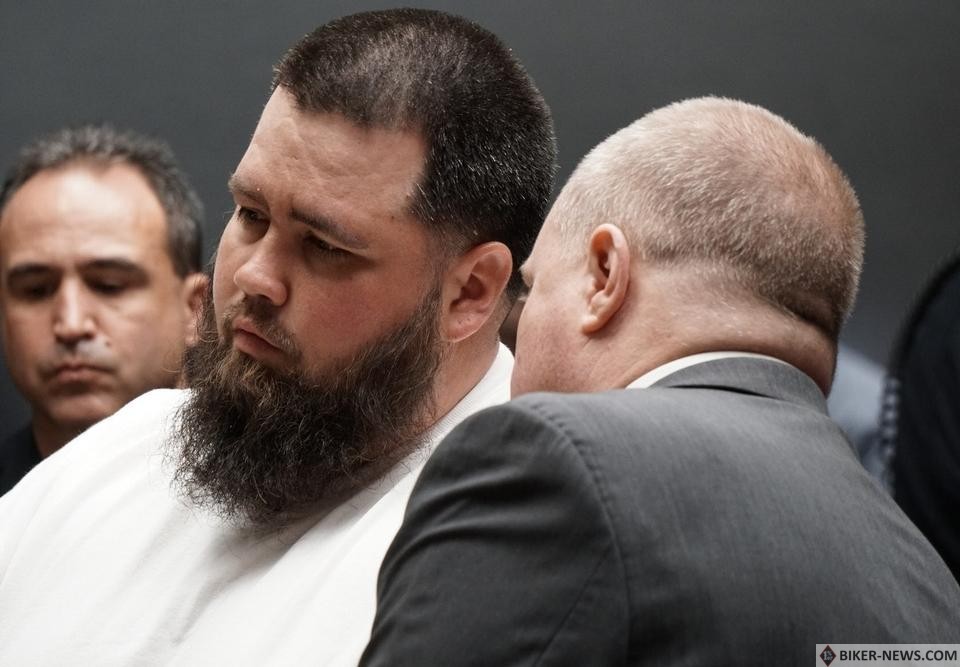PROVIDENCE — State prosecutors are asking the Rhode Island Supreme Court to overturn a ruling that threw out crucial wiretap evidence in a case accusing motorcycle club members and their associates of trafficking drugs and running guns.
Attorney General Peter F. Neronha’s office is asking the high court to reverse a July 2019 ruling by Superior Court Judge Netti C. Vogel that suppressed wiretap evidence gathered after July 13, 2017, from the phones of Deric McGuire.
Authorities cast McGuire, 35, of Burrillville, as the leader of the state chapter of the Pagans MC and a Woonsocket drug-trafficking enterprise.
Vogel concluded in the case of McGuire and 20 of his associates that under state law, only the Superior Court presiding justice or the next-senior Superior Court judge can authorize wiretap interceptions.
In McGuire’s case, Presiding Justice Alice B. Gibney asked Judge Melanie Wilk Thunberg to handle the warrants in the case while Gibney was out on medical leave. Gibney did so because it would have created a conflict for the most senior Superior Court judge, Robert D. Krause, to do so and later preside over the cases, according to lawyers involved in the case. Krause handles the bulk of the state’s gun cases, including those of McGuire and his co-defendants.

McGuire, who had been held without bail, was released on home confinement following the ruling. He faces more than 220 narcotics and weapons charges.
Lawyers for the state argue in a pre-briefing statement to the high court that Vogel got it wrong, that the law gave Gibney the authority to designate Thunberg to perform presiding justice duties — such as handling warrants for wiretaps — in her absence.
The state argues, too, that U.S. Supreme Court precedent allows the admission of evidence seized on “good faith” reliance on a search warrant, as was the case in the McGuire case, Christopher Bush wrote for the state.
The state says, too, that Vogel erred in determining that she was required to suppress the evidence based on a strict reading of the state’s Wiretap Act.
Lawyers for McGuire and his co-defendants counter that the state is raising the same arguments Vogel rejected in July 2019.
The law governing wiretaps requires the senior Superior Court justice to act in Gibney’s absence, in this case Krause, they say.
Further, McGuire’s lawyer, John F. Cicilline, argues that federal and state Supreme Court precedent require suppression when actors have not strictly complied with wiretap law.
And finally, Cicilline asserts that the “good faith” exception is designed to deter police misconduct and “not to punish errors made by judges.”
For almost a year, state and federal agents wiretapped at least seven different telephones used by McGuire, capturing, they say, his recruitment to lead a new Rhode Island chapter of the Pagans MC and documenting his illegal drug operation.
The investigation, dubbed Operation Patched Out, led to 29 raids in May 2018 and the seizure of drugs and weapons, including a rocket launcher. Fifty people were arrested and charged with crimes, authorities say, tied to two Woonsocket-based motorcycle clubs, the Pagans and the Kryptmen.
The 1,274-page affidavit chronicled, too, the state police investigation into biker activity that began in February 2017, when a confidential source told detectives that members of the Thug Riders were dealing drugs, and that tensions were growing among Rhode Island’s many motorcycle clubs.
Make sure you have subscribed to our Facebook page or Twitter to stay tuned!
Source: Providence Journal by Katie Mulvaney
